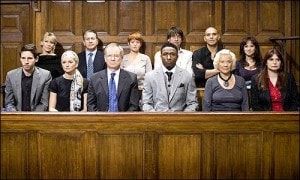 JUSTICE WAS SERVED for another one of Michigan Criminal Defense Attorney
Brian J. Prain's clients when a jury found him
NOT GUILTY of sex crimes (Criminal Sexual Conduct) in May, 2016. It was a long journey,
but in the end, the jury came to a well-reasoned decision, and the client
finally has his life back. In a word: "relief," says Attorney
Brian J. Prain. Read on to find out how the job was done...
JB: Can you tell us what this person you defended was accused of?
BJP: Sure. The name of the actual charge he was facing was called
Assault With Intent to Commit Criminal Sexual Conduct Involving Sexual
Penetration. Because Criminal Sexual Conduct is often shortened to "CSC,"
this charge is also referred to as Assault With Intent to Commit CSC,
as well as Assault With Intent to Commit Sexual Penetration.
More specifically, the man I was defending was falsely accused of violently
attacking a woman and attempting by force to get her to perform oral sex
on him, among other things.
JB: How does this charge fit into the grand scheme of Michigan Criminal
Sexual Conduct laws?
BJP: The Michigan sex crime laws are complex, but they are generally broken-down
into four major categories:
Criminal Sexual Conduct in the First Degree,
Criminal Sexual Conduct in the Second Degree,
Criminal Sexual Conduct in the Third Degree
, and
Criminal Sexual Conduct in the Fourth Degree. Roughly, you could say that Assault With Intent to Commit Sexual Penetration
is somewhat like "Attempted" First Degree CSC or Third Degree CSC.
JB: If he were found guilty, what would the penalty have been?
BJP:
Assault With Intent to Commit Sexual Penetration, MCL 750.520g, is punishable by up to 10 years in Prison, and he would have been on
the public Sex Offender Registry for the remainder of his life after being
released from Prison. So basically, there was no way we could lose this case.
JUSTICE WAS SERVED for another one of Michigan Criminal Defense Attorney
Brian J. Prain's clients when a jury found him
NOT GUILTY of sex crimes (Criminal Sexual Conduct) in May, 2016. It was a long journey,
but in the end, the jury came to a well-reasoned decision, and the client
finally has his life back. In a word: "relief," says Attorney
Brian J. Prain. Read on to find out how the job was done...
JB: Can you tell us what this person you defended was accused of?
BJP: Sure. The name of the actual charge he was facing was called
Assault With Intent to Commit Criminal Sexual Conduct Involving Sexual
Penetration. Because Criminal Sexual Conduct is often shortened to "CSC,"
this charge is also referred to as Assault With Intent to Commit CSC,
as well as Assault With Intent to Commit Sexual Penetration.
More specifically, the man I was defending was falsely accused of violently
attacking a woman and attempting by force to get her to perform oral sex
on him, among other things.
JB: How does this charge fit into the grand scheme of Michigan Criminal
Sexual Conduct laws?
BJP: The Michigan sex crime laws are complex, but they are generally broken-down
into four major categories:
Criminal Sexual Conduct in the First Degree,
Criminal Sexual Conduct in the Second Degree,
Criminal Sexual Conduct in the Third Degree
, and
Criminal Sexual Conduct in the Fourth Degree. Roughly, you could say that Assault With Intent to Commit Sexual Penetration
is somewhat like "Attempted" First Degree CSC or Third Degree CSC.
JB: If he were found guilty, what would the penalty have been?
BJP:
Assault With Intent to Commit Sexual Penetration, MCL 750.520g, is punishable by up to 10 years in Prison, and he would have been on
the public Sex Offender Registry for the remainder of his life after being
released from Prison. So basically, there was no way we could lose this case.

Assault With Intent to Commit CSC - NOT GUILTY!

|
By
Prain Law, PLLC
 JUSTICE WAS SERVED for another one of Michigan Criminal Defense Attorney
Brian J. Prain's clients when a jury found him
NOT GUILTY of sex crimes (Criminal Sexual Conduct) in May, 2016. It was a long journey,
but in the end, the jury came to a well-reasoned decision, and the client
finally has his life back. In a word: "relief," says Attorney
Brian J. Prain. Read on to find out how the job was done...
JB: Can you tell us what this person you defended was accused of?
BJP: Sure. The name of the actual charge he was facing was called
Assault With Intent to Commit Criminal Sexual Conduct Involving Sexual
Penetration. Because Criminal Sexual Conduct is often shortened to "CSC,"
this charge is also referred to as Assault With Intent to Commit CSC,
as well as Assault With Intent to Commit Sexual Penetration.
More specifically, the man I was defending was falsely accused of violently
attacking a woman and attempting by force to get her to perform oral sex
on him, among other things.
JB: How does this charge fit into the grand scheme of Michigan Criminal
Sexual Conduct laws?
BJP: The Michigan sex crime laws are complex, but they are generally broken-down
into four major categories:
Criminal Sexual Conduct in the First Degree,
Criminal Sexual Conduct in the Second Degree,
Criminal Sexual Conduct in the Third Degree
, and
Criminal Sexual Conduct in the Fourth Degree. Roughly, you could say that Assault With Intent to Commit Sexual Penetration
is somewhat like "Attempted" First Degree CSC or Third Degree CSC.
JB: If he were found guilty, what would the penalty have been?
BJP:
Assault With Intent to Commit Sexual Penetration, MCL 750.520g, is punishable by up to 10 years in Prison, and he would have been on
the public Sex Offender Registry for the remainder of his life after being
released from Prison. So basically, there was no way we could lose this case.
JUSTICE WAS SERVED for another one of Michigan Criminal Defense Attorney
Brian J. Prain's clients when a jury found him
NOT GUILTY of sex crimes (Criminal Sexual Conduct) in May, 2016. It was a long journey,
but in the end, the jury came to a well-reasoned decision, and the client
finally has his life back. In a word: "relief," says Attorney
Brian J. Prain. Read on to find out how the job was done...
JB: Can you tell us what this person you defended was accused of?
BJP: Sure. The name of the actual charge he was facing was called
Assault With Intent to Commit Criminal Sexual Conduct Involving Sexual
Penetration. Because Criminal Sexual Conduct is often shortened to "CSC,"
this charge is also referred to as Assault With Intent to Commit CSC,
as well as Assault With Intent to Commit Sexual Penetration.
More specifically, the man I was defending was falsely accused of violently
attacking a woman and attempting by force to get her to perform oral sex
on him, among other things.
JB: How does this charge fit into the grand scheme of Michigan Criminal
Sexual Conduct laws?
BJP: The Michigan sex crime laws are complex, but they are generally broken-down
into four major categories:
Criminal Sexual Conduct in the First Degree,
Criminal Sexual Conduct in the Second Degree,
Criminal Sexual Conduct in the Third Degree
, and
Criminal Sexual Conduct in the Fourth Degree. Roughly, you could say that Assault With Intent to Commit Sexual Penetration
is somewhat like "Attempted" First Degree CSC or Third Degree CSC.
JB: If he were found guilty, what would the penalty have been?
BJP:
Assault With Intent to Commit Sexual Penetration, MCL 750.520g, is punishable by up to 10 years in Prison, and he would have been on
the public Sex Offender Registry for the remainder of his life after being
released from Prison. So basically, there was no way we could lose this case.
Categories:
- Assault With Intent to Commit Criminal Sexual Conduct in the Second Degree,
- Assault With Intent to Commit Criminal Sexual Conduct Involving Sexual Penetration,
- Criminal Sexual Conduct,
- First Degree Criminal Sexual Conduct,
- Fourth Degree Criminal Sexual Conduct,
- Second Degree Criminal Sexual Conduct,
- Third Degree Criminal Sexual Conduct